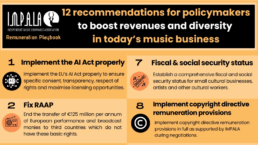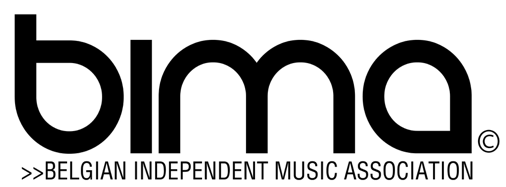Strong Global Reach, Weak Local Presence: The Belgian Music Paradox
RE_BIMAbe1065

Loud & Clear 2024 Spotify report reveal that European artists generated over $1.8 billion on Spotify, marking a 15% increase compared to the previous year. Belgian artists earned approximately €34 million from the platform, up 11%. Notably, over 80% of these revenues came from outside Belgium, highlighting both the international appeal of Belgian music and a lack of local visibility.
BIMA regularly emphasizes this imbalance and advocates for stronger support to improve the discoverability of Belgian artists within their own country. Despite reaching millions of new listeners and growing presence in user-generated playlists, local artists still struggle to gain traction on the Belgian market. BIMA calls on public authorities, platforms, and cultural stakeholders to work together in ensuring fairer exposure of Belgian talent in digital environments.
12 RECOMMENDATIONS TO BOOST REVENUES AND DIVERSITY IN TODAY’S MUSIC BUSINESS
RE_BIMAbe1065

BIMA soutient les 12 recommandations pour améliorer les revenus et la diversité du secteur.
À l’occasion du Mois européen de la diversité, IMPALA appelle les décideurs à agir pour renforcer un écosystème musical européen plus inclusif et profitable aux artistes. Les labels indépendants représentant 80 % des nouvelles sorties en Europe, il est temps d’agir.
Voici les 12 recommandations clés d’IMPALA :
-
Appliquer correctement la législation européenne sur l’intelligence artificielle (IA Act) pour garantir le consentement, la transparence et le respect des droits.
-
Mettre fin au transfert annuel de 125 millions d’euros de revenus européens vers l’Irlande via RAAP.
-
Lutter contre la fraude, le piratage et les pertes de revenus injustifiées.
-
Supprimer la démonétisation sur les plateformes de streaming et les pratiques qui créent une industrie à deux vitesses.
-
Soutenir une rémunération numérique plus équitable, comme proposé dans le plan streaming d’IMPALA.
-
S’opposer aux fusions nuisibles dans l’industrie musicale, comme celle entre UMG et Downtown.
-
Mettre en place un statut fiscal et social adapté aux petites structures culturelles et aux artistes.
-
Appliquer intégralement les règles de rémunération prévues dans la directive européenne sur le droit d’auteur.
-
Rejeter les systèmes de rémunération dits « équitables » qui réduisent les revenus des artistes via les labels.
-
Introduire des crédits d’impôt et des solutions de financement pour les labels indépendants.
-
Garantir le respect des licences collectives, comme celles gérées par Merlin, par les plateformes de streaming.
-
Promouvoir la diversité et la découvrabilité du répertoire musical européen en ligne.
Selon Helen Smith, présidente d’IMPALA, ces mesures visent à maximiser les revenus des artistes et à exploiter pleinement la richesse du secteur musical indépendant européen.
PRESENTATION PUBLIQUE FOCUS CULTURE 2024
RE_BIMAbe1065

Présentation publique du Focus Culture 2024 : rendez-vous le 18 juin à Namur
Le Focus Culture 2024, rapport annuel de l’Administration générale de la Culture (AGC), sera présenté publiquement le mercredi 18 juin 2025 à Namur. Cette édition mettra à l’honneur un thème central pour les politiques culturelles en Fédération Wallonie-Bruxelles : la confiance.
Introduite par la Ministre de la Culture Elisabeth Degryse, la séance permettra d’échanger sur les enjeux actuels de l’AGC avec Jeanne Brunfaut, administratrice générale a.i., et l’ensemble du Comité de Direction. Le bilan annuel de l’AGC sera présenté, enrichi de nouveaux indicateurs (PECA, international, ressources humaines…).
En complément, Céline Romainville, professeure de droit constitutionnel à l’UCLouvain, interviendra pour explorer les dimensions juridiques et sociales de la confiance dans les politiques publiques, à travers une réflexion sur les relations entre confiance, contrôle et responsabilité.
Les membres de la BIMA sont invités à participer activement à cette rencontre, en posant dès à présent leurs questions via le formulaire d’inscription.
Music Move Europe Awards
RE_BIMAbe1065

Music Moves Europe Awards 2026
As each year, BIMA is on board as one of the professional recommenders for MME Awards 2026!
MMEA are doing their best to map out all the emerging and trending acts from across Europe.
That’s why we asked you to send your proposal. Following your recommendation 5 names had been proposed.
The nominated artists will be presented in the autumn. The winners will be selected by the jury and reveal!
Many Thanks for all members proposals!
Fingers crossed.
BIMA GENERAL ASSEMBLY
RE_BIMAbe1065

Dear BIMA Members,
We are delighted to invite you to our General Assembly :
Quand : VENDREDI 13 JUIN 2025
Waar : 6T2 RECORDS
15 rue Fernand Bernier
1060 Brussels
Belgium
10 min lopen van Gare du Midi – naast Place de Bethlehem – Tram 81 MONTGOMERY
Programma :
15h00 – 17h00 // Assemblée Générale
Presentation of Activity report 2024 FR/NL + 2024 Annuel Accounts & Perspectives for 2025
17h00 – Networking Drink
Boost change-making initiatives in the indie sector
RE_BIMAbe1065

IMPALA has just launched a new EU-funded support programme aimed at boosting initiatives that promote equity, diversity, inclusion (EDI), and environmental sustainability within the independent music ecosystem.
Annual support for two initiatives:
- One selected by IMPALA’s EDI task force as part of the Changemaker Award, highlighting an initiative advancing equity, diversity, and inclusion.
- One chosen by IMPALA’s Sustainability Task Force to support a project addressing environmental challenges in the music sector.
This new scheme is part of IMPALA’s work as an EU-recognised cultural network and aims to empower grassroots efforts while fostering systemic change across the independent music landscape.
Get Involved – Opportunities for BIMA Members
BIMA members are encouraged to engage with this programme by:
Submitting eligible initiatives or projects for consideration under the Changemaker or Sustainability awards.
Sharing and promoting the call for applications within their networks.
Participating in knowledge-sharing and capacity-building activities tied to the supported initiatives.
This is a great opportunity for BIMA members to showcase their work, contribute to sector-wide transformation, and collaborate with peers across Europe.
Eén jaar zonder regering in Brussel, ça suffit!
RE_BIMAbe1065

Brussel verdient beter
Al een jaar zonder regering. Onze politici falen collectief terwijl onze stad kraakt.
Op 9 juni om 12u nodigen we iedereen uit op het Beursplein om te tonen waarom Brussel beter verdient.
We eisen respect:
- Voor de stad die we delen
- Voor de inzet van de Brusselaars
- Voor onze toekomst
Brussels deserves better
One year without a government in Brussels. Enough is enough. Our politicians are collectively failing while our city is crumbling.
On June 9 at 12 p.m., join us at Place de la Bourse to show why Brussels deserves better.
We demand respect:
- For the city we share
- For the people who keep it going
- For our future
Bruxelles mérite mieux
Un an sans gouvernement à Bruxelles, ça suffit. Nos responsables politiques échouent collectivement pendant que notre ville souffre.
Le 9 juin à 12h, retrouvons-nous à la Bourse pour montrer pourquoi Bruxelles mérite mieux.
Nous exigeons du respect :
- Pour la ville que nous partageons
- Pour l’engagement des Bruxellois
- Pour notre avenir
UMG/Downtown – A Critical Moment for Indie Music Sector
RE_BIMAbe1065

As the European Commission prepares to rule on Universal Music Group’s $775 million acquisition of Downtown, concerns are growing across Europe — including in Belgium — about increasing concentration in the music industry. Belgian and European stakeholders fear that UMG’s expanding dominance could threaten artistic diversity, market fairness, and the sustainability of independent players. Several EU policymakers have begun raising red flags, urging close scrutiny from regulators.
Important updates on the UMG/Downtown case – Amplify these developments!
Wednesday 16 April
Pressure increases on Universal Music Group’s $775 million acquisition of Downtown as MEP Aurore Lalucq raises alarms about UMG’s “unprecedented control” over the music ecosystem. Complete Music Update highlights her written question to the European Commission and other key developments.
Direct source: here
Tuesday 15 April
Ruth Barlow (AIM & Beggars Group) publishes a powerful opinion in Music Business Worldwide, warning that UMG’s growing dominance poses an existential threat to artistic diversity, fair competition, and the future of music.
Direct source: here
Friday 11 April
MEP Aurore Lalucq, Chair of the European Parliament’s Economic and Monetary Affairs Committee, formally questions the European Commission regarding UMG’s takeover of Downtown.
Direct source: here
Also see MLex’s coverage: here
Spotify for Artists – New Tools & Updates
RE_BIMAbe1065

Spotify has introduced new ways to maximize the impact of your release with tools like Countdown Pages, Clips, and Campaign Kit, as highlighted in the latest Spotify for Artists Masterclass featuring experts from Atlantic Music Group and Secretly Group (working with artists like Charli XCX and Khruangbin).
When sharing a Countdown Page, fans now see a new share card that includes the « Upcoming Album » label and number of days remaining.
Spotify also continues its transparency efforts with Loud & Clear, an initiative to explain how royalties work. The site has just been updated with new insights based on full-year 2024 data.
APPEL : Comite de Sélection Propulse 2026
RE_BIMAbe1065

Rejoignez le comité de sélection musique de ProPulse 2026
Appel aux membres de BIMA pour désigner un·e représentant·e au comité de sélection musique pour Propulse 2026.
🔹 Ouvert à toutes les musiques actuelles : urbaines, francophones, pop, rock, jazz, blues, folk, world et électroniques (hors DJ).
🔹 Les membres doivent analyser toutes les candidatures et participer aux réunions (voir planning).
🔹 La limite de mandat de 2 ans n’est plus appliquée – les membres actuels peuvent renouveler leur participation par simple confirmation par email.
Pourquoi rejoindre le comité ?
✅ Découvrir et soutenir des artistes émergent·es de la FWB.
✅ Mettre votre expertise au service d’une programmation de qualité.
✅ Échanger et collaborer avec des professionnel·les du secteur.
✅ Défendre le travail d’artistes en quête de visibilité.
📩 Comment postuler ?
-
Partagez cet appel avec vos membres.
-
Envoyez un email avant le 4 avril avec les coordonnées et la motivation de votre représentant·e.
Pour plus d’informations, consultez le site ProPulse ou contactez-nous.
Construisons ensemble une édition 2026 passionnante !
